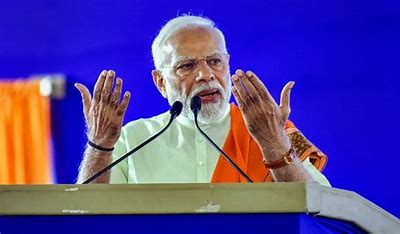The PM will visit Jamui in Bihar, on Friday to commemorate the Janjatiya Gaurav Divas.
New Delhi: Prime Minister Narendra Modi will visit Jamui, Bihar, on Friday to commemorate Janjatiya Gaurav Divas, marking the beginning of the 150th birth anniversary year of Birsa Munda, a prominent tribal freedom fighter and social reformer. The event will include the unveiling of a commemorative coin and postal stamp in honour of Munda. Jamui, along with Koderma and Hazaribagh of Jharkhand, forms a tribal belt, which has historically been the centre for the Santhal, Oraon and Munda tribes.
This will be his second visit to Bihar in three days. He was in Darbhanga on Wednesday to lay the foundation stone for AIIMS and inaugurate other projects. Bihar will go to the polls next year in October-November. One of the highlights of Wednesday’s event was Bihar Chief Minister Nitish Kumar touching the feet of PM Modi and seeking his blessings after completing his speech. Kumar is just six months younger than the PM.
During his visit to Jamui, PM Modi will inaugurate and lay the foundation for a range of development projects aimed at improving infrastructure, healthcare, education, and livelihoods for tribal populations in Bihar and neighbouring regions. These projects, worth over Rs 6,640 crore, are expected to significantly enhance the quality of life in tribal-dominated areas, with an emphasis on long-term, sustainable growth.
Among the key initiatives, the Prime Minister will launch 23 Mobile Medical Units (MMUs), a major step in improving healthcare access for tribal communities living in remote and underserved areas. Additionally, 30 more MMUs will be introduced under the Dharti Aaba Janjatiya Gram Utkarsh Abhiyan (DAJGUA), expanding the reach of medical services to tribal populations in the region.
PM Modi will also participate in the grih pravesh (housewarming ceremony) of 11,000 new homes built under the Pradhan Mantri Janjati Adivasi Nyaya Maha Abhiyan (PM-JANMAN). This initiative aims to provide better housing and living conditions for tribal families, addressing issues related to shelter and sanitation in rural tribal areas.
PM Modi’s visit, which will come amidst the polling in Jharkhand, which will go to polling on 20 November for its second phase, will also focus on education, with the inauguration of 10 Eklavya Model Residential Schools, valued at around Rs 450 crore. These schools are designed to provide quality education to tribal children, bridging the educational divide and promoting greater access to modern learning resources.
In addition to education and healthcare, the PM will also emphasise on the promotion of tribal entrepreneurship by inaugurating 300 Van Dhan Vikas Kendras (VDVKs), aimed at supporting the tribal communities by providing them with opportunities to sustainably use forest resources and generate livelihoods. These centres are expected to play a vital role in boosting economic self-reliance and creating employment within tribal areas.
Infrastructure development will also be a key aspect of the Prime Minister’s visit who will lay the foundation for the construction of 500 km of new roads, designed to improve connectivity in remote tribal regions. Additionally, 100 Multi-Purpose Centres (MPCs) will be established to act as community hubs, offering a range of services that will directly benefit tribal populations.
In an effort to preserve and promote the rich cultural heritage of India’s tribal communities, the Prime Minister will inaugurate two Tribal Freedom Fighters’ Museums in Madhya Pradesh, located in Chhindwara and Jabalpur, as well as two Tribal Research Institutes in Srinagar and Gangtok. These institutions will serve as centres for documenting, preserving, and promoting the history, culture, and contributions of the tribal people to India’s national identity.

